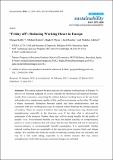“Friday off”: Reducing Working Hours in Europe
Author(s)
Kallis, Giorgos; Kalush, Michael; O.'Flynn, Hugh; Rossiter, Jack; Ashford, Nicholas A.
Downloadmain article (1.082Mb)
PUBLISHER_CC
Publisher with Creative Commons License
Creative Commons Attribution
Terms of use
Metadata
Show full item recordAbstract
This article explores the pros and cons for reducing working hours in Europe. To arrive to an informed judgment we review critically the theoretical and empirical literature, mostly from economics, concerning the relation between working hours on the one hand, and productivity, employment, quality of life, and the environment, on the other. We adopt a binary economics distinction between capital and labor productiveness, and are concerned with how working hours may be reduced without harming the earning capacity of workers. There are reasons to believe that reducing working hours may absorb some unemployment, especially in the short-run, even if less than what is advocated by proponents of the proposal. Further, there may well be strong benefits for the quality of peoples’ lives. Environmental benefits are likely but depend crucially on complementary policies or social conditions that will ensure that the time liberated will not be directed to resource-intensive or environmentally harmful consumption. It is questionable whether reduced working hours are sustainable in the long-term given resource limits and climate change. We conclude that while the results of reducing working hours are uncertain, this may be a risk worth taking, especially as an interim measure that may relieve unemployment while other necessary structural changes are instituted.
Date issued
2013-04Department
Massachusetts Institute of Technology. Center for Technology, Policy, and Industrial Development; Massachusetts Institute of Technology. School of EngineeringJournal
Sustainability
Publisher
MDPI AG
Citation
Kallis, Giorgos, Michael Kalush, Hugh O. Flynn, Jack Rossiter, and Nicholas Ashford. “‘Friday off’: Reducing Working Hours in Europe.” Sustainability 5, no. 4 (April 11, 2013): 1545-1567.
Version: Final published version
ISSN
2071-1050